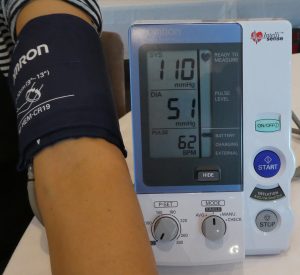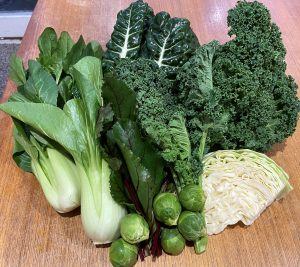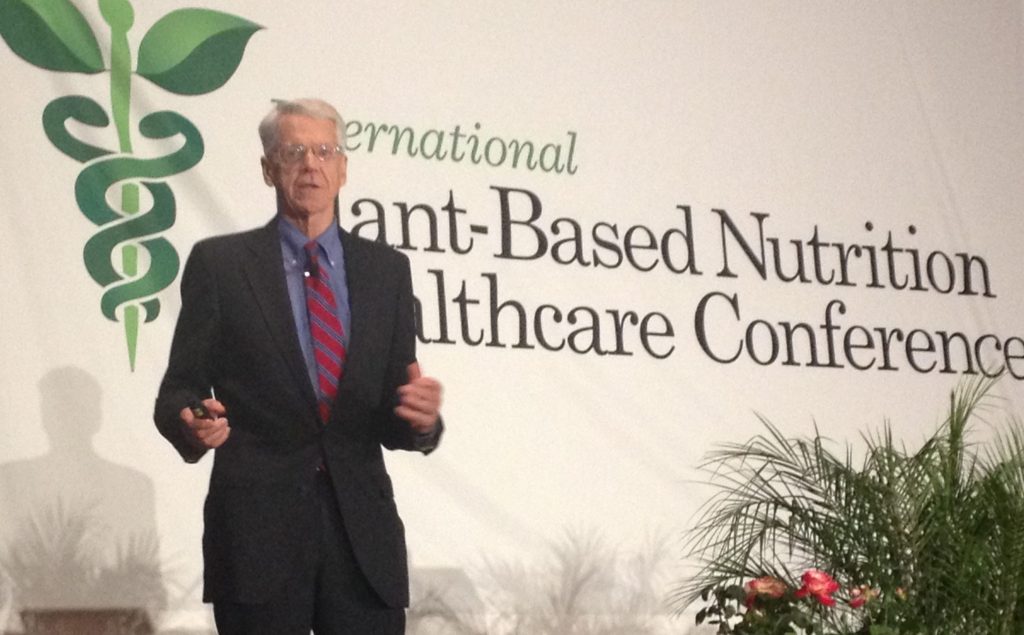Changing to a whole foods plant based diet typically results in dramatic falls in blood cholesterol levels. The medical myth that diet has little effect on cholesterol stems from the fact that the current cholesterol lowering diet recommended in Australia is not effective. A diet rich in animal “protein” foods, with or without vegetable oil, will always raise cholesterol. In general, animal products raise blood cholesterol and whole plant foods lower blood cholesterol.
Cholesterol, fats and fibre
Dietary cholesterol raises blood cholesterol. However saturated fat has a much more powerful effect on raising blood cholesterol. Saturated fats stimulate the liver to synthesize more cholesterol which makes a big difference because most of the cholesterol in our bodies is made by the liver rather coming from the diet. This is why eggs, which are high in cholesterol but relatively low in saturated fat, don’t raise cholesterol as much as some other animal products. (Eating more eggs, however, is associated with more artery disease).
Only animals produce cholesterol. It is found in meat, chicken, fish, eggs and dairy foods. All plant foods are free of cholesterol. Most animal foods contain at least moderate amounts of saturated fats. Some commonly eaten foods such as cheese are alarmingly high in saturated fats. Chicken and lean red meat are promoted as low fat “protein” foods but both contain significant amounts of saturated fat (and to make matters worse, much of the red meat and chicken eaten by those on high protein diets are not the super lean cuts that are used for advertising these foods). Some plants do contain saturated fats: palm oil, coconut, and some nuts are actually quite high in these. But unsaturated fats are more common in the plants.
Only plants produce chemicals called phytosterols which prevent the intestine from reabsorbing the cholesterol that the liver has disposed of through bile. Oats are just one example of a whole plant food that contains sterols that lower cholesterol. Oats are also a nutritious mix of fibre, nutrients, protein and slow release carbohydrate. Cholesterol lowering sterol enriched margarine has no fibre, almost no nutrients, is very high in calories and contains considerable saturated fat. No contest.
Some types of fats produce favourable looking changes in blood cholesterol but do not reduce heart risk. Olive oil for example, improves the ratio of good and bad cholesterol but is still damaging to arteries. The solution to the health damaging effects of a fatty diet is to eat less fat not different fat.
For cholesterol lowering properties, whole plant foods win. They have no cholesterol, are generally extremely low in saturated fats, and they inhibit cholesterol reabsorption. The heart health benefits of whole plant foods go beyond just lowering fasting cholesterol. Plants are rich in phytochemicals that have antioxidant and anti-inflammatory qualities that reduce chemical damage to the endothelium and dampen down the inflammatory response in the artery wall. See Endothelium and atherosclerosis. Once again, the health damaging effects of the usual Australian diet are not just due to what people are eating but also what they are not eating.
The effectiveness of diet
The standard cholesterol lowering diet recommended by Australian health authorities has changed little over the past forty years. It includes generous quantities of meat, dairy foods and oils. The fat content of up to 30% of calories is still high by international standards and the meat and dairy, and even the margarine and olive oil contribute substantial amounts of saturated fats. The fibre content is low. The bottom line is that this type of diet has failed the field tests, lowering blood cholesterol by less than 10%. This has led the medical profession and the public to conclude that diet has very little effect on blood cholesterol and that high blood cholesterol must be caused by genes and other factors.
The main effect of genes is to influence the extent to which your cholesterol will become elevated when your body is exposed to a diet rich in animal products and low in dietary fibre. If you live on a low-fat plant based diet these “susceptibility” genes become irrelevant. The Apo E4 cholesterol gene mutation causes much anxiety in those that have it as it is associated with dementia and heart disease, but international studies suggest that these risks are negated by a heart friendly diet. There are some exceptions: one in every few hundred Australians carry a genetic mutation that causes high LDL cholesterol levels. Even these individuals can lower their cholesterol to moderate levels by diet alone.
All communities who consume low-fat plant-based diets have very low blood cholesterol levels. The China Study observed that in some regions average blood cholesterol levels were as low as 2.4. However some argue that these people were living a non-Western lifestyle and perhaps their low cholesterol was related to hard physical work, low stress or malnutrition. Previous theories attributing their low cholesterol levels to genetic or childhood epigenetic changes have been dispelled by the rapid rise in cholesterol and heart disease in newly Westernised Chinese city dwellers. This has occurred within one generation.
There are numerous studies showing that a low-fat mostly plant-based diet results in a dramatic reduction in blood cholesterol levels in those living an otherwise normal Western lifestyle. Nathan Pritikin became well known following the success of his live-in program which included a very low-fat predominantly plant-based diet and exercise program. Blood cholesterol levels fell by 25% in those that started with average cholesterol levels and by 36% in those who started with even higher levels. In the Lifestyle Heart Trial conducted by Dr Dean Ornish, average cholesterol levels also fell by about 25% (without cholesterol lowering drugs). Dr Caldwell Esselstyn virtually cured heart disease in a group of 18 subjects whom he treated for over 20 years with a no oil plant based diet. Average cholesterol levels fell from 6.3 to 3.5 (some subjects also used medication). Rip Esselstyn, author of Engine2, recorded average decreases in cholesterol of about 30% in those that followed his no oil plant based diet.
It seems that a whole foods plant based diet typically lowers blood cholesterol by 30%. The fact that falls in blood cholesterol are greater for those with higher initial levels makes sense because what is in effect happening here is that blood cholesterol levels are falling to levels that are normal for humans.
See also:
Resources
- Blocking the First Step of Heart Disease – In this short video, Dr Michael Gregor discusses how we can prevent atherosclerosis in our coronary arteries by increasing our intake of fiber-containing plant foods and decreasing our intake of trans fat, saturated fat, and cholesterol found in junk food and animal products.
- Cancer Reversal Through Diet? – This video starts off by discussing a landmark study by Dr Dean Ornish, way back in 1993, which showed that intensive lifestyle changes can reverse atherosclerosis, opening up narrowed arteries. The discussion then moves to cancer prevention: a welcome side effect for a heart disease treatment program.
- Lower Your Cholesterol Using Fiber! – Linda Carney, MD
- Cholesterol Prevention and Cholesterol Diet – PCRM, includes link to a 4-page PDF factsheet. See also Cholesterol and Heart Disease
- TEDxCambridge – Caldwell Esselstyn on making heart attacks history – Dr Caldwell Esselstyn discusses the results of his heart disease reversal diet.
- Vegans with High Cholesterol – Sarah Taylor
Page created 13th January 2013
Last updated 24th September 2018

 Hypertension (high blood pressure) is a leading cause of death worldwide. It’s a major risk factor for heart disease and strokes and causes damage to kidneys and other organs. It is so common in older people in Australia and other developed countries that it has been considered a normal part of aging – but it need not be so. Blood pressure does not rise with age in communities who subsist on minimally processed plant-based diets. Even within developed countries, individuals who follow vegan diets have a quarter of the risk of hypertension as those who eat meat.
Hypertension (high blood pressure) is a leading cause of death worldwide. It’s a major risk factor for heart disease and strokes and causes damage to kidneys and other organs. It is so common in older people in Australia and other developed countries that it has been considered a normal part of aging – but it need not be so. Blood pressure does not rise with age in communities who subsist on minimally processed plant-based diets. Even within developed countries, individuals who follow vegan diets have a quarter of the risk of hypertension as those who eat meat.

